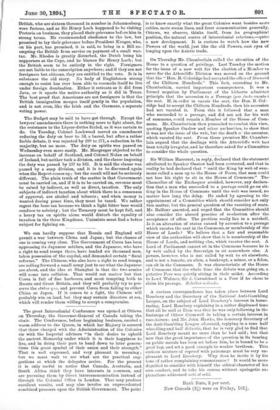Sir William Harcourt, in reply, declared that the statement attributed
to Speaker Onslow had been corrected, and that in reality he had declared that " until the King by writ of sum- mons called a man up to the House of Peers, that man could not lose his right to sit in the House of Commons." The Chancellor of the Exchequer avoided, however, any declara- tion that a man who succeeded to a peerage could go on sit- ting in the House of Commons until the writ was issued, no matter how long the delay. He ended by agreeing to the appointment of a Committee which should consider not only this matter, but the general question of the vacating of seats. Mr. Balfour assented, and urged that the Committee should also consider the absurd practice of re-election after the acceptance of office. The problem really lies in a nutshell. Is it an alteration of status caused by accession to a peerage which vacates the seat in the Commons, or membership of the House of Lords ? We believe that a fair and reasonable view of the authorities will show that it is membership of the House of Lords, and nothing else, which vacates the seat. A Lord of Parliament cannot sit in the Commons because he is by writ called by the Sovereign to sit somewhere else. A person, however, who is not called by writ to sit elsewhere, and is not a lunatic, an alien, a bankrupt, a minor, or a felon, can sit in the Commons. It was characteristic of the House of Commons that the whole time the debate was going on, a putative Peer was quietly sitting in their midst. According to Lord Wolmer, Sir J. Carmichael is a Peer if he chose to claim his peerage. Solvitur sedeudo.


















































 Previous page
Previous page